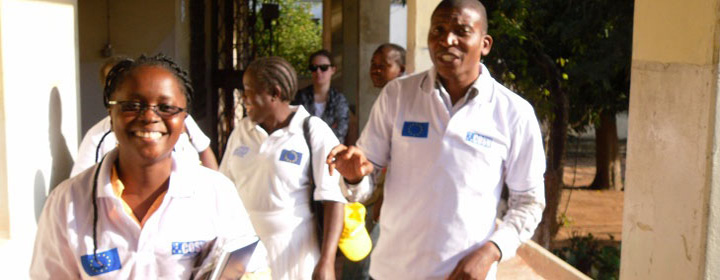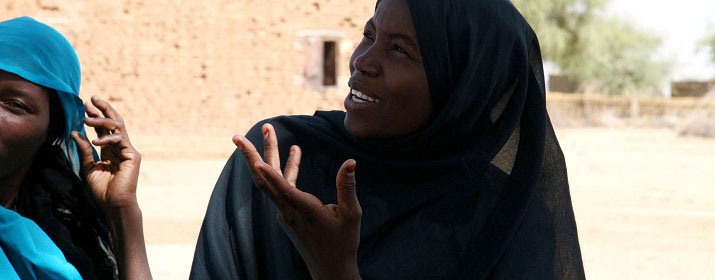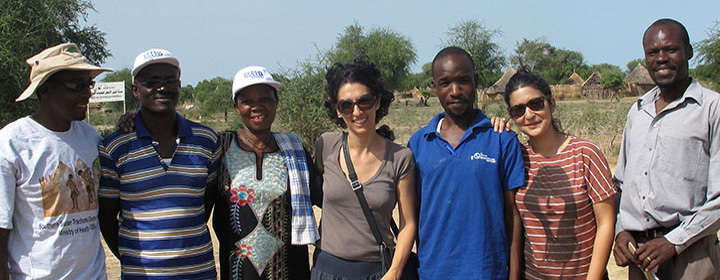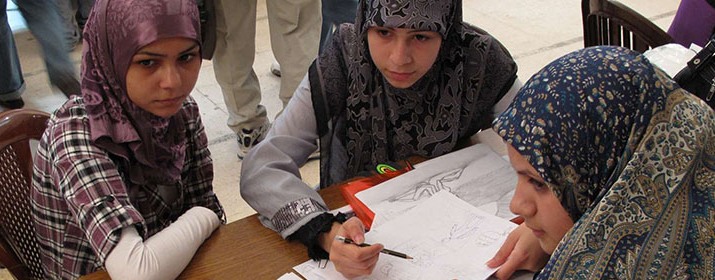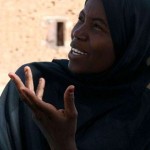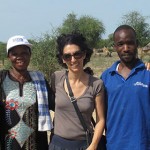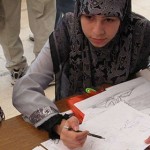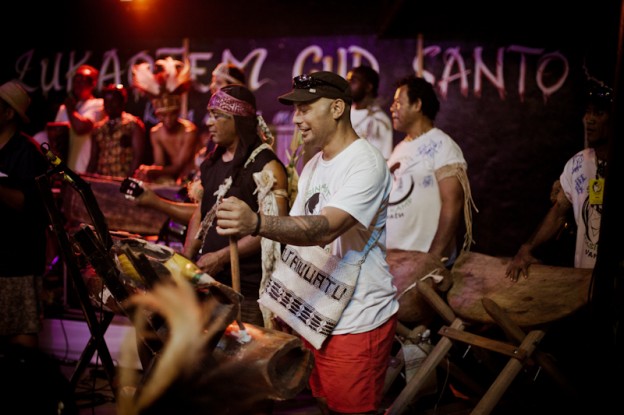“The song that we brought is called One Nation, and is a tribute to humanity. Whether our origin is in the North, South, East or West, we are all part of this world and we care what is happening in every corner of the world, “said Petra – her origins are in West Papua, but she was born in Vanuatu and then grown up in Australia, where the family has obtained a residence permit as political refugees. “For this song we have created a flag with a circle that encompasses all directions.”
She hung the banner over a flip chart, where she wrote the lyrics. Around her sixty musicians – surrounded by the forest on the island of Espiritu Santo (Vanuatu) – followed her in the chorus of One Nation at a rate of Jambe, violins, ‘mbira, guitars, ukuleles, flutes, dijiridu. They are the participants of the Singaot Musik Kamp, the first residential camp for musicians in the Pacific, organized within the project Music Bridges with funding from ACP-EU Culture program.
They are from Fiji, Solomon Islands, Samoa, New Caledonia, Papua New Guinea, West Papua, Tonga, Australia, Austria, La Reunion, Mozambique and Vanuatu, they are all artists who are trying to keep alive the traditions and culture of their homeland through music, bringing them on stage and making them travelling in the sounds of other musicians. This is this Music Bridges, a project to promote the meeting between cultures through the fusion of sounds and contribute to the development of the music industry in Vanuatu and Mozambique.
The stories of the musicians have become intertwined in the incredible environment of the forest near the village of Mon Exil, in intensive creative workshops to work on a common track that opened the festival Lukaotem Gud Santo and went on the stage of the famous Fest Napuan, the biggest musical event of Vanuatu, which annually attracts about 40,000 visitors.
“Being part of this project is a unique opportunity. The creative exchange, growth as a musician, the chance to play at two festivals with other musicians from the Pacific and Africa … this is an experience that I will remember for a lifetime,” said Willie Tekatoha, keyboard player of the group Kaumaakonga – from Solomon Islands. “I admit that before leaving I thought about it several times, I did not know exactly what to expect …I do not live on music and in order to participate I got a period of leave to work. And it was the best choice I could do. “
There are few musicians in the Singaot Musik Kamp who live on music: the music industry in the Pacific and Southern Africa have in common a structural weakness, they are not able to protect the rights of artists and lack adequate opportunities for artistic promotion. For musicians of the Pacific, in particular, lack of performance opportunities, to meet and exchange with international artists. To support the musicians in the access to musical circuits and personal paths of professionalization, the project therefore provided for the organization of three workshops on the themes of the music industry and self-management, copyright and free licenses.
“Vanuatu is a very young country, from the point of view of the music industry,” said Marcel Meltherorong, songwriter and guitarist of Vanuatu, at the workshop on music industry and self management. “The first concert on stage there was in 1996, there are no music labels, recording studios are present only in Port Vila and Luganville, the copyright law is not implemented and there does not exist a collective management society.”
In a context so fragile, it is essential for musicians to understand the mechanisms of self-management: how to propose, to try to build a career, to exit from the stereotype that the musician is just an entertainer. Rufus Maculuve of Music Crossroads of Mozambique, led the workshop, with the help of some musicians of the camp, such as Ofa Fainaka – from the island of Tonga. “Being a musician is not just about playing and singing,” said Ofa. “To be a professionist you must also know how to manage to whole business of musician: contacts, relations, performances. There may be a manager who is responsible for managing the group or the musician, but there is also the possibility of a self-management that works. I do not have a manager, and I can manage my musician life autonomously. “
The presence of trainers from Mozambique has strengthened the connection between intra-ACP contexts, especially in the field of copyright, and sensitive topic of great interest. Jaime Joel Guambe and Benjamim Batista Nandja of Somas (collective management societies of Mozambique), with the contribution of Seru Serevi, of the collective management society in Fiji, presented their experiences and opened the way for the creation of the first collective management company of Vanuatu. The musicians who took part in the workshop managed to identify a representative for each island, with the intention to maintain active contacts with trainers and structuring a society in Vanuatu.
Free licenses and Creative Commons licenses have closed the workshop sessions in Port Vila, with the presence of Cristina Perillo of Lettera 27 and Soohuyn Pae, regional coordinator of the Creative Commons Asia-Pacific network. Music Bridges is the first event in Vanuatu that opens to Creative Commons, with the view to continue in the next year of the project a path to greater understanding and use of free licenses for the promotion of musicians.
Closed the first major event of Music Bridges, the team composed by the associations Music Crossroads Mozambique, Further Arts and COSV prepares for the next round .. 2014 in Maputo!

